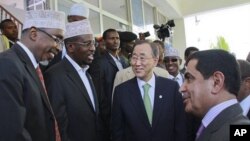Just back from a visit to Somalia's capital, U.N. Secretary-General Ban Ki-moon says the retreat of militant groups such as al-Shabab from Mogadishu presents an opportunity to stabilize the country. Ban also told the U.N. Security Council Tuesday that additional troops might be required to secure these military gains.
On Friday, Ban paid a lightning visit to Mogadishu - the first time a U.N. chief has visited the war-torn country in more than 18 years.
“That my visit was even possible is a sign of improved security and the investment that the United Nations has made in supporting the African Union Mission in Somalia,” he said.
He said that all districts in the city are effectively under the control of the Transitional Federal Government, with the assistance of some 9,000 African Union troops from Uganda and Burundi which make up the force known as AMISOM.
He also emphasized the pullout from the capital of Islamist insurgents, particularly al-Shabab, which he said are retreating under growing pressure from government forces and their militia allies, which are backed by troops from Kenya and Ethiopia.
The secretary-general said the gains made by these forces must be secured beyond the capital.
“That requires AMISOM to deploy at its full strength of 12,000 troops," said Ban. "It also demands the necessary force enablers, including air assets, like helicopters, and military engineering capabilities.”
Ban told the 15-member Security Council that additional forces beyond the authorized 12,000 might be required in order for the military strategy to be successful across Somalia.
“On the military front, we must not exclude the incorporation of new forces and the expansion of AMISOM," said Ban. "We are undertaking a joint assessment on the ground and will revert to this Council with a proposal.”
While in the region last week, Ban also visited the Dadaab refugee camp in Kenya which hosts nearly a half-million Somali refugees. Nearly half of them have been displaced this year due to both insecurity and famine.
Ban said assistance from the international community has saved hundreds of thousands of lives and that parts of southern Somalia have been lifted out of famine. But he warned that millions of people remain in danger of starvation.
UN Chief: More Troops May Be Necessary for Somalia




